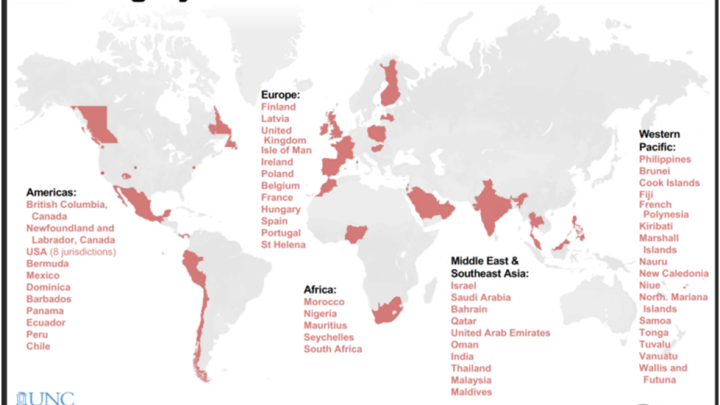Mama Risikat Kasali’s back burned from the welts of the scorching sun as she dropped the ice-cold bowl of cold drinks in front of the Ikeja City Mall in the heart of Nigeria’s commercial capital, Lagos. It is already afternoon. She had spent the better part of this Saturday morning chasing passengers who alighted from buses at the Alausa secretariat, asking if they needed sausage rolls and soft drinks for their on-the-go meal.

She is, however,not oblivious of the latest tax the Federal Government hadimposed on carbonated drinks from January 2022. A 50cl bottle of such drink formerly sold for N100 before the tax. But the price has currently doubled and is going higher as this piece is being read, adding more pressure on a nation where over 133 million poor people (out of 200 million people) are struggling to keep head over water with a spiraling inflation. She tells our reporter the government has to intervene in the matter, adding, “Before now, it was N150 per 5ocl, and customers said it was expensive. The price is still on the rise.”
The rise of Sugar tax in Nigeria
On January 5, 2022, the Federal Government of Nigeria introduced tax on non-alcoholic beverages. The Minister of Finance, Zainab Ahmed, who made this disclosure while giving a breakdown of the 2022 Appropriation Act said the tax became necessary to discourage excessive consumption of sugar in beverages.

Ahmed said the sum of N10 per litre had been imposed on sweetened beverages as part of critical policy thrusts of the Finance Act 2021.
She said, “In section 17 of the Finance Act, there is a law that has imposed a duty on non-alcoholic carbonated sweetened beverages. There is an excise duty of N10 per litre imposed on all non-alcoholic carbonated and sweetened beverages and this is designed to discourage excessive consumption of sugar in beverages which contributes to a number of health conditions including diabetes and obesity.
“This new sugar tax is introduced to raise excise duties and revenues for health-related issues and other critical expenditures. It is in line with the 2022 budget priorities.”
This is not the first time a country has imposed tax on sugar-sweetened beverages (SSBs). A blog, Obesity Evidence Hub revealed that at least 55 countries have introduced a tax on SSB, including the United Kingdom, South Africa and Mexico. A few blogs report that the approach works in stemming the tide of sugary drinks consumption, especially in Mexico and South Africa.

Quite commonly, research has continued to advocate for how excessive taxation on tobacco, alcohol, and sugary beverages could avert 10 million premature deaths each year and about 16 percent of all deaths in the world. Already the research noted that six million deaths are linked to diabetes and obesity as a result of the growing sugar consumption in low and middle-income countries and amongst adolescents. While these may sound very good, they fail to take into consideration, the ripple effect of the policy on businesses,including unemployment if these SSBs taxes are enforced and increased over time especially in a country like Nigeria.
Blowback
Already, the Manufacturers Association of Nigeria (MAN) has kicked against the idea to tax drinks, noting that it could hurt 1.5 million jobs.
MAN’s Director-General, Segun Ajayi-Kadir, said in an interview six days after that pronouncement that the measure was just a way of taxing the vulnerable and raising revenue for government projects.
He said, “We know, for instance, that the food and beverage sub-sector contributes about 38 percent of the manufacturing contribution to gross domestic product (GDP) and 22.5 percent of the jobs created, employing 1.5 million persons. We have a feeling that this is the kind of sector we need to guard against any negative thing falling there.
“We see that in the long run, the introduction of this excise duty will not augur well for revenue for the government and performance for the sector. The way it hits us, we are looking at a situation where it ought to be revisited with adequate dialogue and then we can find a common ground.”

He added, “It is what has been described by some who have commented on it as ‘pennywise and pound foolish’ in a sense. If you look at a revenue gain of N81 billion between 2022 and 2025, you compare this with a possible revenue loss of N142 billion in Value Added Tax (VAT) and N54 billion in Company Income Tax (CIT) over this period. I think it would be a better idea to allow the sector to continue on its growth pathways.”
In another opinion piece by the Chairman of the Foundation for Consumer Freedom Advancement, Olumayowa Okediran, he insisted that the argument of taxing Nigerians to avoid them from consuming sugar drinks doesn’t carry water.
“According to the minister, this policy will discourage excessive sugar consumption in beverages. And because it contributes to several health conditions like diabetes and obesity, the government thinks this tax will raise revenues for the health sector. If you think about it, this argument is flawed. Excessive sugar consumption is not the only known cause of diabetes and obesity; neither is increased taxes the solution to diabetes.
“There are two things we need to note here. First, the government wants to prevent Nigerians from having diabetes and obesity by collecting more taxes from beverage companies. And second, the primary aim of the government is to source funds to cushion its budget deficit, as it is projected that this excise duty will bring about N81 billion to the government’s coffers in three years. Despite these seemingly lofty aims, we must understand that this is a bad idea economically, “he wrote.
Already, the acting Managing Director of BUA Foods, Ayodele Abioye, said that the imposition of sugar tax on companies could impact the firm’s production of sugar.
Abioye, who spoke at the Facts Behind the Listing event organised by the Nigerian Exchange Group earlier this year, stressed that the sugar market was majorly underserved.
“The impact of tax as we know is going to affect our customers largely in the downstream value chain of the food industry and that will also have a backward impact on us. However, we believe that the market is underserved,” he said
Fact-Check
This Fact Check is designed to find out if Minister Zainab Ahmed’s claim that “excessive consumption of sugar in beverages contributes to a number of health conditions including diabetes and obesity,” is true.
According to healthline.com, diabetes is a condition where the body can no longer regulate blood sugar levels in the body. It can happen in two ways. It can happen when the pancreas stops producing insulin or are resistant to insulin. This is bearing in mind that insulin is the hormone that moves sugar out of one’s bloodstream to the cells.
While there are different types of diabetes. Two are the most common. Type 1 is caused when the immune system is attacked by the pancreas and insulin production is stopped while type 2, usually the commonest, is when the pancreas stops producing insulin.
Healthline holds that while there are links that prove that high sugar intake lead to outright diabetes, not one research has been able to prove that sugar causes diabetes. It acknowledges the fact that people who regularly drink sugar-sweetened beverages have a 25 percent risk of type 2 diabetes. It also argues that the impact of fructose can increase the risk of the impact, but may not significantly lead to diabetes as claimed by Nigeria’s Minister of Finance.
It goes further to explain that natural sugars do not contribute to diabetes. Natural sugars can be found in fruits and vegetables that have not been processed.
Diabetes.org while providing the distinction between sugar and diabetes states that one doesn’t need to cut out sugar if one has diabetes. It goes further to argue that for diabetes type 1, sugar “doesn’t directly cause the condition.”
In the case of whether sugar causes diabetes type 2, it says that ideology is too simplistic.
It reads, “The question of whether sugar directly causes type 2 diabetes is a bit complicated. Because diabetes is a condition where blood sugar levels are too high, it’s all too easy to think eating too much sugar is the cause.”
The website clearly states that sugar doesn’t cause diabetes type 1 as it is a matter of insulin-producing cells in one’s pancreas being destroyed by the immune system. For diabetes type 2, it says that being overweight makes it more likely for one to suffer diabetes.
“You gain weight when you take in more calories than your body needs, and sugary foods and drinks contain a lot of calories.
“So you can see if too much sugar is making you put on weight, then you are increasing your risk of getting type 2 diabetes. But type 2 diabetes is complex, and sugar is unlikely to be the only reason the condition develops,” it explains.
Medical News Today states that research on whether sugar consumption leads to diabetes type 2 is still ongoing.
“Research into the connection between sugar consumption and type 2 diabetes is ongoing. Eating sugar alone may not lead directly to diabetes, but sugar may play a role. Diabetes is a complex condition that results from a range of factors.”
One thing is clear from these three scientific journals – high calories can lead to obesity which in turn, can be a risk factor for diabetes 2.
Harvard School of Health is affirmative that excessive sugar intake leads to diabetes. It states that there is strong evidence that sugar-sweetened soft drinks contribute to the development of diabetes. It adds that people who take between 1-2 cans of sweetened beverages daily have a 26 percent greater risk of developing type 2 diabetes than people who rarely have such drinks, noting that the risk is greater in young adults and Asians.
It is important here to add that the World Health Organisation (WHO) recommends no more than 10 percent sugar daily for consumption. In fact, the American Heart Association (AHA) recommends a maximum of nine teaspoons or 36 g or 150 calories of sugar daily for males while it sets the maximum limit of six teaspoons or 25 g or 100 calories daily for females.
Emeritus Professor at the University of Ibadan, who specialises in Human Nutrition, Professor Tola Atinmo, argues that sugar must be avoided at all costs.
He said, “If you eat too much sugar, it is related to heart disease, diabetes and obesity. There are three problems. There is a cardiovascular problem. There is a direct relation between too much sugar and those causes- obesity, heart disease and diabetes. You have to educate the people to understand that they should take very little sugar.
“As an expert, I don’t take sugar. It is better to avoid it. All these sweet drinks, Coca-Cola and Chivita, you have to avoid them to live long. Type 2 diabetes affects people who are very old. From 40 onwards, you have maturity-onset diabetes because your pancreas cannot produce a lot of insulin. You have to undergo various issues. You have to avoid it.”
A medical practitioner, Dr Eghosa Omoruyi, offers clarity by stressing the health risk of excessive sugar in the bloodstream.
He said, “For starters, we may not be able to say A=B or Sugar= diabetes. But I can guarantee you that A + B +C= diabetes. What that means is that A being sugar, B being another thing else, C being another risk factor, when they all come together, they hasten the rate of coming down with diabetes. There is a relationship between sugar and diabetes, we cannot deny that. But it in itself doesn’t translate to diabetes.
“The body utilises the food we eat in the form of sugar. The more sugar dumped in the body; the more insulin is required to pump it. You are now giving the
pancreas extra work. For instance, to simplify my point, let’s say if the pancreas is meant to work for just two hours at a time, it may be forced to work five hours giving an unusually huge amount of glucose to deal with. Continuous dumping of sugar overworks the pancreas till it breaks down and then there is excess sugar in the blood which leads to diabetes.”
He notes that type 1 diabetes may not be common among adults, but he adds that type 2 is common. He adds that obesity, and fat compounds the sugar problem which would lead to diabetes. He stresses that sugar cannot be exempted from the diabetes conversation.

Eghosa, nonetheless, weighs into the Finance Minister’s reason for taxing sugar, explaining that increasing the tax on sugar would not curbconsumption.
“On a policy level, that is a big lie. The sugar tax is not a means to control sugar consumption. There are many things taxed in the world that the consumption has not reduced. Do you know the amount of money nations are making from taxing tobacco? It hasn’t stopped smoking. One could create revenue financially by taxing beverages, however if the tax is for health reasons, it doesn’t make any scientific sense. It doesn’t accomplish anything. Does the inflation we are currently experiencing stop people from buying stuff? No. So, taxing sugar doesn’t reduce the consumption of non-alcoholic carbonated and sweetened beverages. Taxation of other addictions like tobacco, gambling and sugar sweetened beverages (sin taxes) are never controlled by increasing the monetary cost of those products. Rather, we have seen an upsurge in the consumption of these products over time,” he explained.
Reduced sugar consumption?
Mrs.Suleiman, who hawked drinks along ShopRite, believes that taxing the drinks would not solve any immediate problem.
“If they want to tax drinks,won’t it increase? They haven’t taxed it yet and some people can’t afford it,” she responded.
Eniola Prysce, who weighed into the matter, said the policy was not to tackle sugar consumption but fund the budget.

He said, “The policy is obviously a way to generate revenue because they cannot fund the budget. Budget deficit is going to increase next year so they are looking for other alternatives to fund their lifestyle. This includes taxation, import and export duties, Value Added Tax (VAT) and possibly social media- content creators. Subsidy removal is also another way. Is the budget working for the Nigerian people… no? So they want to fund the budget and pay their overheads.”
Prysce added that a functional government would not be taxing soft drinks as the way forward.
Peace Odia, an athlete said he was not a heavy consumer of carbonated drinks. He, however,believed the government should be focusing on other endeavours than taxing soft drinks.
Already, the Buhari administration had introduced six new taxes. They are the Companies Income Tax (CIT), Tertiary Education Tax (TET), National Information Technology Development Agency (NITDA), Police Trust Fund Levy, National Agency for Science and Engineering Infrastructure (NASENI) levy and the NYSC levy. Experts have repeatedly flayed the Buhari administration for imposing multiple taxes on Nigerians.
Nigeria ranked number 4 highest consumer of soft drinks- NGO
An Abuja based non-governmental organisation, Project PINK BLUE, revealed that Nigeria ranked 4th in the world for the highest consumers of soft drinks. Its Executive Director, Runcie Chidebe, said this during the global week of action for non-communicable diseases which held in September 2022.
She said, “Nigeria is the world’s 4th highest consumer of SSBs commonly known as soft drinks. An estimated 38.6 million litres of soft drinks are sold in Nigeria annually. Of particular concern is overconsumption among adolescents as indicated in a study where 97 percent of the 1,000 respondents consumed at least 35cl of soft drink daily. A 35cl bottle may contain as much as nine cubes of sugar, while the WHO recommends that individuals should take less than 10 cubes per day.”
The biggest losers in this policy
While the SSB tax is already in effect, the Federal Government has recently proposed in raising the tax to 20 percent which has led to more blowback from carbonated drinks manufacturers, as many complained that there had been an eight percent decrease in revenue between July and August this year, and this decline is expected to reach 25 percent by December 2022.
At a recent stakeholders meeting in December, manufacturers revealed how the tax discouraged one of the bottling companies from proceeding with its £300 million investment plan.
Last line
Eghosa stresses the importance of letting the audience control and reduce their sugar intakes.
“Increased sugar leads to diabetes in association with other factors. However, saying that the tax on sugar beverages would lead to even the slightest reduction in sugar consumption is not tenable neither is it practicable,” he maintains.
While the fact-check of whether sugar directly causes diabetes is inconclusive, the Finance Minister’s reason to tax sugar is not enough grounds to stop its consumption, but only affects the affordability of the product by vulnerable citizens.




